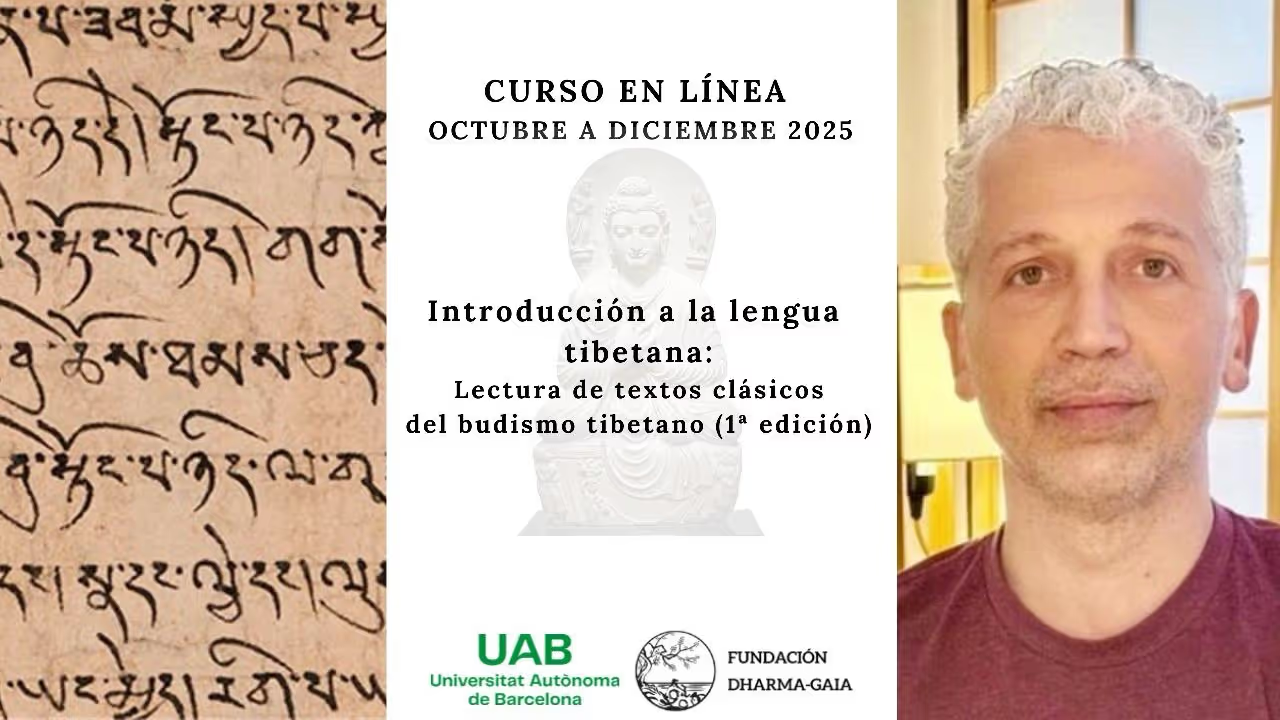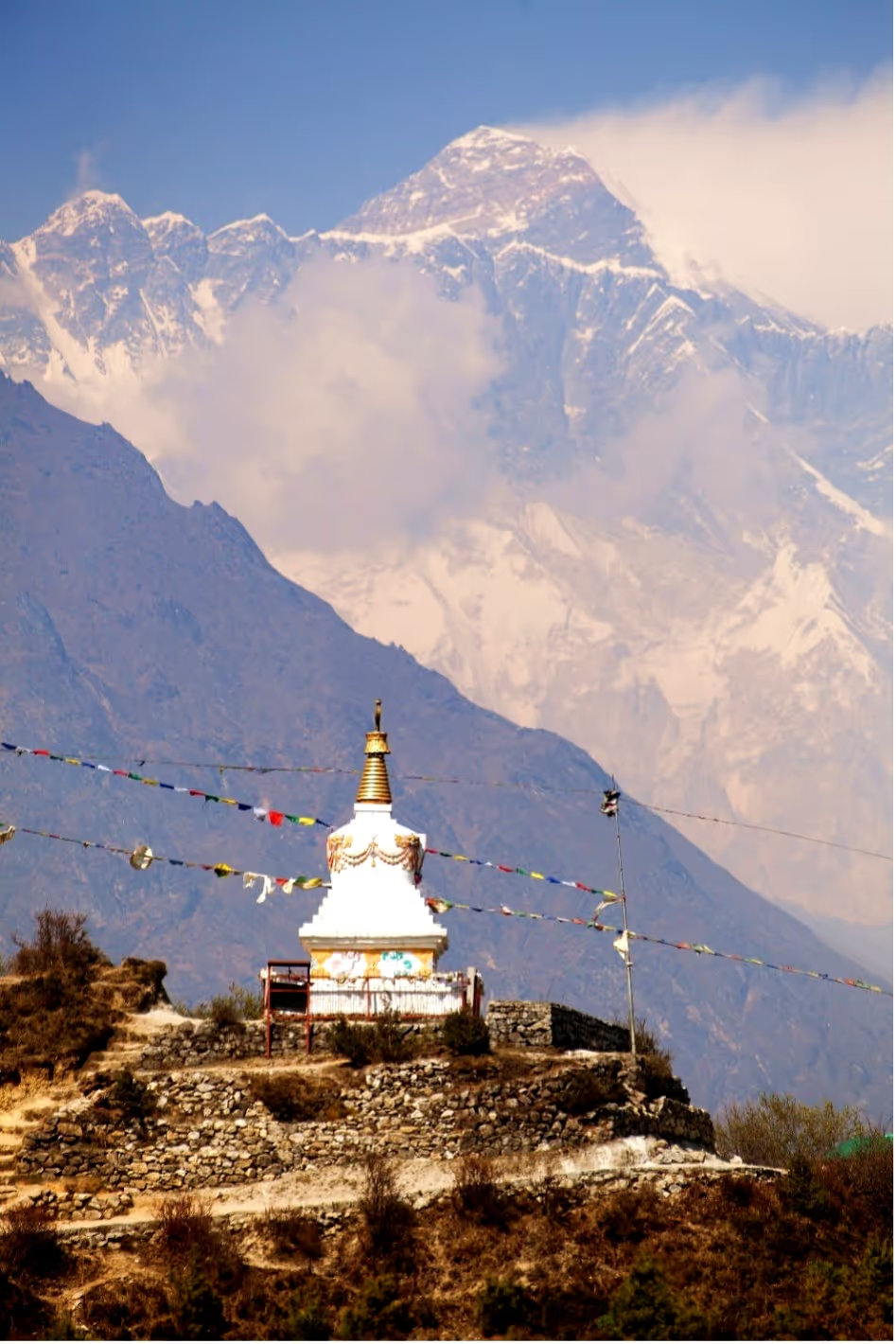The Autonomous University of Barcelona (UAB), at the initiative and in collaboration with the Dharma-Gaia Foundation (FDG), launches a pioneering course in Spain entitled "Introduction to the Tibetan language: reading classical texts of Tibetan Buddhism", aimed at students and professionals who wish to delve into the study of the language and primary sources of Tibetan Buddhism.
IMPORTANT: This course has specific admission requirements. Candidates must be between 25 and 64 years old, have Spanish nationality or fiscal residence in Spain, and have a secondary or higher education degree. Places are assigned in strict order of enrollment.
What philosophical nuances are contained in the original terminology used by great masters to transmit the most profound teachings of Buddhism? What conceptual melodies are lost when Tibetan Buddhist terms are translated into our Western languages? Have you ever wondered what the Buddha's teachings sound like in classical Tibetan?
This course offers you the opportunity to enter the fascinating world of the classical Tibetan language and start reading texts in their original language, without any previous knowledge. Over the course of 25 hours, you will receive a solid grounding in the writing, grammar and essential vocabulary of classical Tibetan, allowing you to take your first steps towards reading original Tibetan Buddhist texts directly.

Program content:
The program covers the basics of traditional Tibetan script, the calligraphy used in classical manuscripts, along with mastery of the Tibetan alphabet. Students will also learn standard transliteration systems, indispensable tools for any serious study of this language and for accessing scholarly editions of classical texts.
The training includes fundamental grammatical elements, such as the structure of Tibetan sentences, essential grammatical connectors and the syntactic particularities that distinguish this language from Western languages. This grammatical foundation is crucial to understanding how the Tibetan language actually works and why certain Buddhist concepts are expressed so specifically in the original, revealing nuances that are often lost in translation.
Specialized Buddhist vocabulary is another cornerstone of the program. Students will master key Tibetan Buddhist terms, always contextualized within the Tibetan Buddhist tradition. This approach allows a deeper understanding of fundamental concepts in their original form and facilitates direct access to the primary sources of Tibetan Buddhism.
The reading and commentary of authentic texts represents the heart of the course. Students will work with selected fragments of classical texts, gradually developing the ability to decode and understand original writings. This hands-on methodology allows them to directly experience the process of reading the classical language and to understand the historical and cultural context surrounding these ancient texts.

Ferran Mestanza García, the teacher in charge of the course, brings more than 25 years of experience in the study and practice of the dharma. His training includes specialization in Oriental Languages and Civilizations with a specialization in Tibetan from INALCO in Paris, as well as study stays in India, Nepal and Paris as a disciple of the renowned Tibetologist Ramón Prats. As founding director of the Mindfulness Center of Barcelona and an active translator of Buddhist texts from Tibetan, Mestanza combines academic rigor with practical experience, offering a balanced perspective between linguistic study and experiential understanding of the Dharma.
Practical information:
- Dates: September 29 to December 22, 2025.
- Modality: Online.
- Duration: 25 teaching hours.
- Seating: Maximum 30 to ensure personalized attention.
- Price: 36 €. Amount with NextGenerationUE Fund discount applied.
- Credits: 4 ECTS credits.
- Language: Spanish.
- Study code: 5118/101.
- Registration dates: From 01/06/2025 to 21/09/2025
Schedule: Monday and Friday from 5:00 p.m. to 6:00 p.m. (Barcelona, Spain time).
ACCESS REQUIREMENTS (MANDATORY): Before registering, please verify that you meet ALL of these requirements:
- Age: Between 25 and 64 years old (no exceptions).
- Spanish nationality or tax residence in Spain.
- High school diploma or higher.
Required documentation:
- DNI, NIE, TIE (scanned on both sides) or valid passport.
Selection criteria: Places are allocated in strict order of registration among candidates who meet all entry requirements.
This program is especially valuable for:
- Buddhist practitioners who wish to deepen their knowledge of the original sources.
- Students of philosophy, religion or Asian studies.
- Translators interested in expanding their language skills.
- Mindfulness and meditation professionals.
- Anyone with genuine curiosity about Tibetan culture.
Although no prior knowledge of Tibetan is required, it is essential to meet the age, nationality/residency and educational requirements mentioned above. It is recommended that these requirements be verified prior to registration.
Career opportunities:
A basic command of classical Tibetan opens doors to multiple professional fields. In the academic field, it prepares for research in Asian and religious studies, specialized teaching and the publication of original works. The cultural sector offers opportunities in translation of Buddhist texts, consulting for Asian organizations, management of specialized museum collections and cultural journalism. In addition, the growing interest in contemplative practices in contemporary contexts creates new opportunities for professionals who combine knowledge of original sources with the ability to transmit these teachings.

A unique opportunity in Spain:
This course represents the first step toward a deeper and more authentic understanding of Tibetan Buddhism. The nuances that are lost in translation, the puns of the masters, the implicit cultural references, all of these will begin to reveal themselves as direct reading skills are developed.
The Autonomous University of Barcelona (UAB) is consolidating its position as a reference in the academic study of Buddhist traditions by offering training in Pali, the language of Theravada Buddhism, and by announcing the availability of Sanskrit courses scheduled for April-June 2026. These initiatives provide essential tools for direct access to the primary sources of Buddhism.
This training represents a unique opportunity in Spain to begin the formal study of classical Tibetan from a serious and accessible academic perspective. Places are limited (maximum 30) and are allocated on a first-come, first-served basis to those who meet the requirements, so please register as soon as possible if you meet the admission criteria.
Registration and information:
- Contact: Gustavo Pita Céspedes
- Email: Gustavo.Pita@uab.cat
- Phone: 935868901.
- Detailed information: UAB website
Remember to verify that you meet all access requirements before registering.
Links of interest:
Faculty of Translation and Interpreting of the Autonomous University of Barcelona
School of Continuing Education
Articles published in Buddhistdoor in English
"The situation of Buddhist studies in Spain: teaching programs" by Juan Arnau Navarro, Montse Castellà Olivé, Francisco Díez de Velasco, Ricardo Guerrero Diáñez, Basili Llorca Martínez, Daniel Millet Gil, Agustín Pániker Vilaplana, Aleix Ruiz Falqués, Jaume Vallverdú Vallverdú, Abraham Vélez de Cea.
Presentation of the book "In the Words of the Buddha. An anthology of Discourses of the Pali Canon, by Bhikkhu Bodhi" by Caridad Martin Nieto.
Key publications in Spanish-speaking Buddhist Studies
Buddhist Studies in Latin America and Spain (Volume I)edited by Daniel Millet Gil and Jaume Vallverdú. This first volume brings together a series of essays that explore the relationship between Buddhism and Spanish American culture, addressing topics such as the reception of Buddhism in Latin America and Spain, translations of Buddhist texts into Spanish and the impact of Buddhism in contemporary societies.
Downloadable at:
https://llibres.urv.cat/index.php/purv/catalog/view/563/583/1270
Buddhist Studies in Latin America and Spain (Volume II)edited by Daniel Millet Gil and Jaume Vallverdú. The second volume expands the focus of the first, including contributions that analyze Buddhism from interdisciplinary and regional perspectives, with emphasis on its interaction with local cultural traditions and its impact on the academic sphere.
Downloadable at:
https://llibres.urv.cat/index.php/purv/catalog/view/595/610/1301










